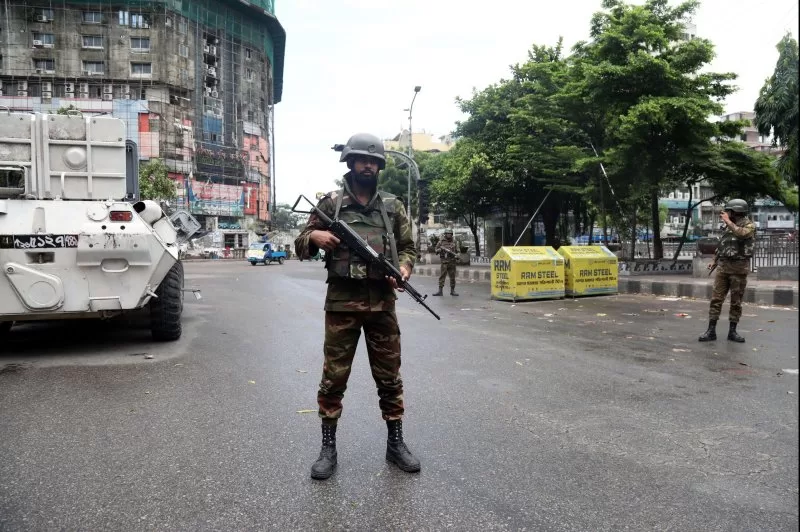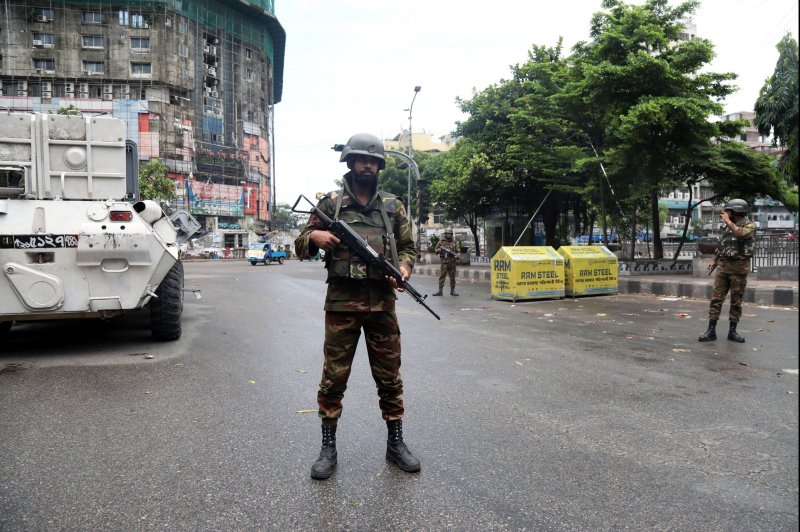Bangladeshi troops stand guard in the capital, Dhaka, on Monday on day three of a national curfew imposed by the embattled government of Sheik Hasina in an effort to quell major unrest over quotas for government jobs. Security forces across the country were authorized to ‘shoot on sight’ to enforce the lockdown. Photo by Alam Monirul/EPA-EFE
July 22 (UPI) — Bangladesh’s Supreme Court overturned a lower court’s ruling that a government decision scrapping quotas for civil service hiring was illegal after more than a week of deadly street violence in which at least 115 people have been killed and hundreds more injured.
The country’s top judges on Sunday slashed the percentage of government jobs that can be reserved from 56% to 7%, with most of the cuts coming from jobs reserved for relatives of veterans of the country’s 1971 independence war, down to 5% from 30%.
The quota of jobs for ethnic minorities shrunk from 5% to 1%, with a further 1% physically disabled people and the remainder being recruited on merit.
So-called Bangla Bockage student protests over the High Court’s judgment in June that government guidance abolishing the quotas was unconstitutional, spilled over into violence earlier this month after the Supreme Court granted a 30-day stay of the judgment.
Riot police in several cities fired tear gas and plastic bullets to break up clashes between the student wing of Prime Minister Sheikh Hasina’s Awami League, known as the Chhatra League, and students demanding an end to the quotas.
Student lawyer Shah Monjurul Hoque hailed the Supreme Court decision as giving “a final solution to this quota system.”
However, amid a total Internet/social media blackout imposed by the government Thursday night followed 24 hours later by a nationwide lockdown, other student leaders have vowed to go on with their protests calling for justice for protesters killed in recent days and the freeing of detained protest leaders.
They are also demanding the Internet be switched back on and for government ministers to resign.
“Our main demand is with the executive [Prime Minister Hasina’s administration],” Bangla Blockade coordinator Nusrat Tabassum told the BBC.
“Until those demands are implemented, the ongoing nationwide complete shutdown program will continue.”
The San Francisco-based Internet-tracking service Cloudflare Radar reported that three days into what it called “the government-directed blackout,” Bangladesh’s Internet remained completely offline for all intents and purposes.
“Almost no address space is being announced by Internet Service Providers in the country,” it said in an update on X.
Attempts by UPI to access domestic news media websites on Monday, including the Dhaka Tribune and The Daily Star, met with a “Website is Currently Offline” or “Connection timed out: Error code 522” message.
Law Minister Anisul Huq rejected suggestions that the protests were an existential threat to the government and Sheikh Hasina just months after winning a controversial fourth-consecutive five-year term in widely discredited elections in January.
“In that case, you would have seen the mass population of the country revolt. They have actually supported the government in this turmoil and they have said ‘yes’, the government should act to bring the violence to an end,” he said.
Huq instead accused opposition forces of exploiting the protests for their own purposes and tearing down “the symbols of Bangladesh’s development”.

